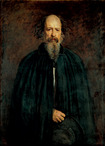day by day: a blog
July 05, 2009
the red sea
 [image: Alfred Tennyson, by John Everett Millais, 1881, National Museums Liverpool, Lady Lever Art Gallery] 'For I dipt into the future, far as human eye could see, | Saw the Vision of the world, and all the wonder that would be.'
[image: Alfred Tennyson, by John Everett Millais, 1881, National Museums Liverpool, Lady Lever Art Gallery] 'For I dipt into the future, far as human eye could see, | Saw the Vision of the world, and all the wonder that would be.'
Cloak-like, Death wraps itself around the name of Tennyson. Or rather, Tennyson -- a poet of 'emotional intensity and violence… [and] the blackest melancholia' as T. S. Eliot said -- wrapped the cloak death around himself. Death is the master-theme of Tennyson's poetry: all his central poems are elegiac, most obviously 'In Memoriam'. It is a though his whole vision of life was a deathly one. He told one correspondent: 'When I was about twenty, I used to feel moods of misery unutterable! I remember once in London the realization coming over me, of the whole of its inhabitants lying horizontal a hundred years hence. The smallness and emptiness of life sometimes overwhelmed me –-.'
All this is well-known. Less well-known, but very disturbing and startling -- as if, although there is no logical or causal connection, art were nonetheless casting a shadow onto the actual world -- is to see how the artistic theme of death has played out in family history. One can do that simply by tracing the tragic motif in the lives of Tennyson's descendants through their successive generations.
The first generation: Son of a manic depressive and alcoholic father, brother to several extremely eccentric and troubled siblings, Tennyson and his wife Emily Sellwood lost their first child, an unnamed boy, at birth in 1851. Subsequently, they had two surviving sons, Hallam Tennyson and Lionel Tennyson, the latter of whom, during a feverish, doomed voyage back from India to England, died at the age of 32 in April 1886 near Aden in the Red Sea. 'The loss to us is indeed unspeakable but infinite Love and Wisdom have ordained it', Tennyson wrote that year, certainty dwindling in the course of his sentence. (He also used the word 'unspeakable', albeit in a different way, in his 1888/89 poem about Lionel's death, 'To the Marquis of Dufferin and Ava'.)
Before his death, Lionel and his wife Eleanor Locker (the daughter of the poet Frederick Locker-Lampson) had two sons who survived to old age, one of them being the influential mid-century Tennyson commentator Sir Charles Tennyson. Hallam Tennyson, the Poet Laureate's other son, the survivor-figure from the first generation, and his wife Audrey Boyle had three sons of his own. Of those three boys from the second generation, two were killed in action during the war of 1914 to 1918. One, Sub-Lieutenant Hon. Harold Courtenay Tennyson, died when his ship hit a mine in the English Channel in 1916, and one, Captain Hon. [Alfred] Aubrey Tennyson, perished on a battlefield in France in 1918. Hallam and Audrey Tennyson's other son, Major Hon. Lionel Tennyson (named after his dead uncle) was wounded three times during the conflict and only barely came through the war.
The third generation: Sir Charles Tennyson and his wife Ivy Pretious had one daughter who died at birth in 1910. They subsequently had three sons. The first, Lieut. [Frederick] Penrose Tennyson was killed in a plane crash while on active service in July 1941. The second, Capt. [Charles] Julian Tennyson was killed in action in 1945. One of this trio of Tennysonian offspring might have seemed to have avoided violent death However, the third, [Beryl] Hallam Tennyson, the great-grandson of the poet, in London in December 2005 at the age of 85 was stabbed to death in his bed.
'To question, why | The sons before the fathers die, | Not mine!' Tennyson exclaims in 'To the Marquis of Dufferin and Ava' as he confronts his own son's death. Not mine, either. I am just keeping score. In Tennyson's case, his first child died at birth and one of his other sons died at the age of 32 'beneath a hard Arabian moon | And alien stars'. Two of his grandsons died violently during the First World War, one at sea, one on land. Two of his great-grandsons were killed in action during the Second World War, one from the air, one on land. And their surviving brother, another of Tennyson's great-grandsons, was murdered. Tennyson once described 'In Memoriam' as 'rather the cry of the whole human race than mine'. British history of the first half of the 20th century is filled with death. But, even judged against that sombre general benchmark, this swathe of tragedies is stunning and gives a new, painful kind of spin to the idea of a poet's social "representativeness".
I would like to have asked Mick Imlah about all this. I should have done so. He loved Tennyson's poetry and understood it, as his own poems show, in extraordinary ways. He was almost digitally attuned to posthumous reverberations of poetry in life: just look at 'Afterlives of the Poets' in The Lost Leader, part one of which is taken up with his 'phantom Tennyson Centenary project'. I know he would have had some reactions to this eerie, morbid ripple of abrupt terminations expanding outwards from the Laureate centre through the Tennysonian generations. Probably his reactions would have been strange and acute, perhaps even unsettling. Silence, though, is all. For Mick himself 'is not here; but far away' and now I can never ask.
Posted by njenkins at July 5, 2009 02:29 AM
With the exception of interspersed quotations, all writing is © 2007-09 by Nicholas Jenkins